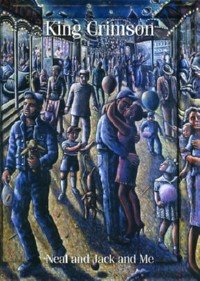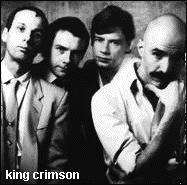
Which Crim do YOU like?
All musicheads know the band King Crimson, but in case you are in the dark go here: http://en.wikipedia.org/wiki/King_Crimson
Like any artist, the brothers Crim have gone through many personnel changes with one exception: Robert Fripp, the band's founder and unofficial leader. He is still a sour puss who would rather drive nails into his foot than sign autographs, but we'll get to that.
Watching the DVD Neil and Jack and Me has made me begin to think about all things Crimson. What is this Crim thing all about?
On the whole, Crimson fans are incredibly loyal, vocal, sincere and some even have an unhealthy, obsessive admiration for Fripp. I believe they see (or use) Fripp as a symbol of their own uniqueness. Crimson as the thinking person's music, blah, blah. Yes, it sounds like teenage hero worship, but there it is.
Crimsonites can also be so loyal to one period and one period only. The Crim periods can be divided into three: 1969-74, 1981-84, and 1994 to present.
The '69-74 period shows a band at times groping for a direction, but when they really all come together, the results are amazing. They were creating a new rock language- a language which influences bands today (Tool would be a good example). Here the convergence of jazz, blues-rock and even concepts stolen from 20th century "classical" music make up the Crim compost of influences. As any VHS Behind the Music ominous voiceover will tell you, there came a time when "things began to turn horribly wrong." and the Crim disbanded. Some older folks can't get past this period and love to snuggle their gatefold remasters of "In the Court of the Crimson King." Nothing wrong with this period, some of my favorite Crim is from this era, but these constant reissues are so irrelevant to me.
 The 80's Crim is my favorite incarnation. This DVD shows the Belew-Levin-Bruford-Fripp lineup in fine form. Bruford looks like he's having the time of his life, running around playing both acoustic and electronic drums. Belew makes it all look so easy as he releases those monsterously strange sounds from his guitar. Sour puss Fripp looks like an accountant or a classical musician who's wandered onto the wrong stage. But, the guy who puts it all together is Tony Levin who is simply
The 80's Crim is my favorite incarnation. This DVD shows the Belew-Levin-Bruford-Fripp lineup in fine form. Bruford looks like he's having the time of his life, running around playing both acoustic and electronic drums. Belew makes it all look so easy as he releases those monsterously strange sounds from his guitar. Sour puss Fripp looks like an accountant or a classical musician who's wandered onto the wrong stage. But, the guy who puts it all together is Tony Levin who is simply  one of the finest musicians of our time. Watching his hands playing the stick is worth the price of admission.
one of the finest musicians of our time. Watching his hands playing the stick is worth the price of admission.The music played on these concerts hasn't aged and all the band members have their moments of brilliance.
The 1994 to present group, I have to admit I have limited appreciation for. While there are some good tracks that I have heard from this time period, I feel like the band sounds like they are so desperate to do something new and consequently, it comes off as dry and academic. It's the Arnold Schoenberg period of the band. People who find chaotic dissonance played to impossible time signatures good listening have my blessing, but having gone through that in music school, I'll pass.
Give me a good groove any day.

1 comment:
But, that first period has many sub-periods (roughly corresponding to the recordings):
(i) In The (Court... / Wake... ). The Giles bros. are here, having co-founded the band with Fripp, Greg Lake (mostly), Pete Sinfield. The McDonald / Collins woodwinds are prominently featured. The band utilized a variety of instrumentation, tonal colors and textures, many moods and styles are reflected in the music. Cheers to MVP Keith Tippett for contributions on, particularly, Cat Food. Gordon Haskell's voice appears only in a limited role.
(ii) Lizard. The sound of the band, as well as the personnel, had evolved, though most writers lump these periods together. Gordon Haskell's voice is now out front, clearly distinguishable from Greg Lake's. Mark Charig and Keith Tippett are here to lend more instrumental variety. The epic "Lizard" features long instrumentals with a horn section (following the unmistakable Jon Anderson vocal) and electronics.
(iii) Islands. More personnel changes, and again a different feel for the band. Boz Burrell's vocal and bass contributions are poppish and incongruous (to my ears) with Fripp and the others. Different drummer, sparer sound, backing string quartet and sleazy lyrics.
(iv) Lark's Tongues... / Starless ... / Red. Cross, Fripp, Wetton and Bruford (with Jamie Muir of the robust British free jazz scene stealing the show on Lark's Tongues). LTIA is probably my favorite KC. Fripp's playing and sound are more highly developed, but he still has some dynamic range. Bruford is delightful, Wetton's vocals and bassing are fine, and Cross' violin provides an opportunity for texture and orchestration. These three records provide the greatest continuity of sound and concept since its inception.
I find this early period the most satisfying. Discipline was a triumphant return for KC in 1981, and a terrific record. In some ways, with Bruford in tow, it was a logical extension of (iv), and so immediately recognizable as King Crimson to my ears. As the record wore on me, I did come to miss the orchestration, the horns, the violin. Even an acoustic guitar for a change would be nice. The commitment to a heavy metal sound, with little dynamic variety, spelled the end of this band for me.
In hindsight, Beat was a weak follow-up, though it had its moments. Three of a Perfect Pair was just bad. I bought Vrooom and Thrak when they came out (more out of force of habit than anything else), tried to like them and failed miserably.
Post a Comment